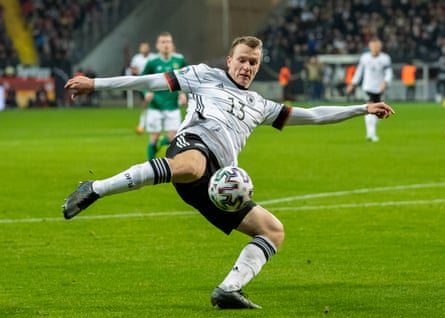This article is part of the Guardian’s Euro 2020 Experts’ Network, a cooperation between some of the best media organisations from the 24 countries who qualified. theguardian.com is running previews from two countries each day in the run-up to the tournament kicking off on 11 June.
If you Google Lukas Klostermann, you will find some special entries about his sporting career, such as the one from 2007 when he put down 5.43m in the long jump in the under-11 age group. Or a report on the time as a 10-year-old that Lukas won the Super Sprint Final in front of 70,000 fans at Berlin’s Olympic Stadium, winning the 50m in 7.21sec.
As a child Klostermann played for his hometown club, Gevelsberg, but first he wanted to emulate his parents and become a track and field athlete. In the 1970s and 80s, it was still possible for the decathlete Hans-Peter Briegel to switch careers at the age of 17 and go on to play in two World Cup finals. In the current era, in which German professional footballers are trained in academies as children, Klostermann’s sporting switch to football later in his childhood is an unusual one.
When Klostermann decided to play football in his teenage years, he went to Bochum. There he became a Germany youth international. He was 17 when he was picked in the Zweite Bundesliga, the second tier. In 2014 Wolfgang Geiger and Sebastian Barth from Leipzig discovered him. “Our scouts noticed him because of his speed,” Ralf Rangnick says.
The then sporting director of RB Leipzig still has in mind how Bochum’s coach of the time, Peter Neururer, reacted to the move of the “Bochum boy” Klostermann to eastern Germany. “We had just been promoted to the second division when Neururer said Klostermann was making a huge mistake and should look for another adviser.” Klostermann, who initially played for Leipzig’s under-19s but soon became a regular, is one of the great successes of the club’s scouting. “It went really well for him,” says Rangnick in a deliberate understatement.
RB Leipzig are disliked by many fans in Germany because they believe Red Bull’s Dietrich Mateschitz is buying success with his great wealth. But this is only half of the story. Leipzig paid only €1m for Klostermann. In addition to Marcel Halstenberg, Emil Forsberg, Marcel Sabitzer, Peter Gulacsi and Willi Orban, Klostermann played for RB in the second division, Yussuf Poulsen even in the third. This group still determines the atmosphere in the dressing room and forms the core of the team that reached the semi-finals of the Champions League in 2020 and performed consistently well in the Bundesliga this past season.
If you ask Klostermann’s coaches and companions about his strengths, the values instilled in him by his parents appear high up the list. “Lukas is a quieter guy,” says Rangnick, “fully focused on his job. He has a very clear opinion about things, but doesn’t say them without asking.” Rangnick was particularly impressed by Klostermann’s ability to come back stronger after a cruciate ligament injury in 2016. “I got to know him as a great person and a great professional.”
“Lukas is an exceptionally good player and a down-to-earth guy,” says Leipzig’s current coach, Julian Nagelsmann. “I can always rely on him. He has never disappointed me in terms of mentality, but also in terms of quality. He always works, listens, does his best for the team and does the tasks that we as the coaching team have planned for him without complaint.”

In fact, the 25-year-old Klostermann is not one of the great individualists. It is unlikely he will ever move to one of the big clubs. He fits perfectly with the Leipzig team, who thrive on team spirit and physique. “His pace is outstanding, his strength in duels and headers too,” says Nagelsmann. His ability to play penetrating passes has improved. “He also has other skills he can exploit.”
Klostermann rarely loses his running duels and can use his strength to push his opponent away from goal in a fair way. The penalty he gave away when he fouled João Félix in the quarter-finals of the 2020 Champions League was a rare mishap. “He defends seriously and he is flexible,” says Nagelsmann. That is his most important asset: Klostermann can play in all positions in defence, centre-back or full-back, left or right and in a back four or back five.
Klostermann may not be the Germany player whom fans would miss most if Joachim Löw did without him at the Euros but his flexibility means he is likely to be high up on the squad list. In Germany’s internationals in March, he was used in two of three games, but not in the shock 2-1 defeat by North Macedonia.
For Löw, improvisation is required in defence. The Germany backline has been uncertain for years and Klostermann’s chances of getting a place in the starting XI are increasing. His defensive qualities as a full-back could make him a vital choice against strong opponents. With a similar player, Benedikt Höwedes on the left, Germany became world champions in 2014.
Oliver Fritsch writes for Die Zeit.
Follow him on Twitter @OliFritsch.
For a tactical guide on Germany click here.
Comments (…)
Sign in or create your Guardian account to join the discussion